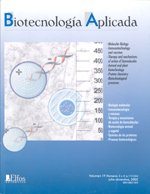
|
Biotecnologia Aplicada
Elfos Scientiae
ISSN: 0684-4551
Vol. 12, Num. 2, 1995, pp. 80-81
|
Revista Biotecnologia Aplicada 12(2): 80-81
(1995)
REPORTE CORTO/SHORT REPORT
Presented in the Congress Biotecnologia Habana'94. La Habana,
Cuba, Nov. 28 - Dec. 3, 1994
INTRODUCTION AND IMPLEMENTATION OF MOLECULAR TECHNOLOGY FOR
THE DIAGNOSIS AND EPIDEMIOLOGY OF INFECTIOUS DISEASES IN LATIN
AMERICA
Eva Harris^1, Alejandro Belli^2 and Nina Agabian^1
^1Intercampus Program in Molecular Parasitology, University of
California at San Francisco, 3333 California Avenue, Suite 150,
San Francisco, CA 94118; ^2National Diagnostics and Reference
Center, Ministry of Health, Managua, Nicaragua.
Code Number: BA95021
File Sizes:
Text: 5K
No associated graphics
INTRODUCTION
Molecular techniques, such as the polymerase chain reaction (PCR)
and nonradioactive DNA probes, can be applied to the diagnosis
and epidemiology of infectious diseases in countries of limited
resources. When appropriately implemented, these molecular
techniques are more rapid, more sensitive, more specific, safer,
and less costly than existing methods. We have developed a
successful format for the transfer of molecular technology to
Latin American countries through the use of on-site hands-on
workshops (1).
The program is comprised of sequentially staged and progressively
more complex courses which provide participants with solid
experience in the theory and practice of molecular technology,
epidemiology and proposal development. The courses progress from
the introduction of molecular technology (Phase I) to its
implementation by local scientists (Phase II and beyond) and are
accessible to a wide range of participants, since prior training
is not a pre-requisite. Course I is designed in consultation with
local scientists, who select the pathogens to be detected based
on national health priorities. Participants in the first workshop
then design the pilot studies they will conduct in Course II and
collect the appropriate samples. These pilot studies from the
basis of grant proposals detailing larger studies which are
developed during Course II. These courses have been conducted in
Nicaragua and Ecuador and are planned in a number of additional
countries in the region.
MATERIALS AND METHODS
Existing methodologies (PCR and nonradioactive DNA probes) for
detection of a range of pathogens were adapted for country-
specific applications, allowing course participants to detect
Leishmania, V. cholerae, M. tuberculosis, dengue
virus, Shigella and enterotoxigenic E. coli, and P.
falciparum in clinical and environmental samples. Extraction
procedures were simplified for rapid processing, and PCR was
carried out by manual amplification or with a thermocycler, if
available. Simple but effective precautions were used to minimize
the chance of cross-contamination of samples, including frequent
treatment of bench surfaces and micropipettor shafts with sodium
hypochlorite (household bleach) and the use of separate rooms and
separate sets of micropipettors for the preparation of PCR
reactions, DNA extraction, and analysis of amplified products.
RESULTS AND DISCUSSION
These workshops have received enthusiastic responses from
participating scientists, physicians, and medical technicians.
Each course includes 20 participants from throughout the country;
for instance, in the most recent Phase I course in Ecuador,
participants came from 8 cities representing 15 different
institutions. As a result, important contacts and collaborations
have emerged between individuals and institutions, at the
national, regional and international level.
As a consequence of these courses, several projects have been
initiated in such areas as the molecular epidemiology of
Leishmania in Central America and the molecular diagnosis of
tuberculosis. An ongoing study in Nicaragua funded by the
European Economic Community involves the identification of
Central American strains of Leishmania by molecular means (PCR,
RAPD, RFLP) and the molecular characterization of putative hybrid
strains (2). Pilot projects for the upcoming Phase II course in
Ecuador planned for May, 1995, include the molecular diagnosis
and epidemiology of tuberculosis, the detection of dengue virus
in clinical samples and in the rapid typing of Leishmania strains
from clinical specimens. Similar courses are currently planned
in Bolivia, Honduras, Argentina and Brazil as well.
REFERENCES
1. HARRIS, E. et al . (1993). Biochemical
Education 21(1): 16-22
2. BELLI, A. A. et al. Parasitology, in press.
Copyright 1995 Sociedad Iberolatinoamericana de Biotecnologia
Aplicada a la Salud
|
